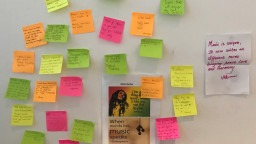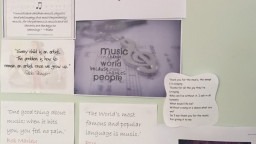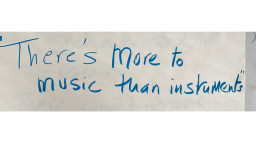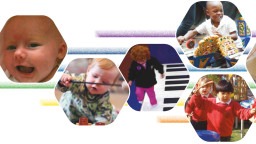Developing your practice and provision
Practical suggestions and supportive documents to develop music provision and practice.
Music in early childhood settings is not often high on the list of priorities, this is due to many reasons. Lack of training and CPD opportunities for early childhood practitioners in early childhood music education means that there is a lack of knowledge and understanding in the workforce. A priority on ‘school readiness’ has resulted in a focus on areas of learning and development such as phonics, maths and literacy; with music and the arts being sidelined.
As well as this, many early childhood practitioners often speak of their lack of confidence when it comes to music and this often stems from their own early childhood experiences. The two most common examples that people tend to draw upon are examples such as:
- being asked to mime and not sing whilst performing in a choir at school
- being told that they were not musical because they were not able to e.g. play the triangle at the correct moment
Both examples are a small part of music making, imply an adult led model of practice and are geared towards performance. The 4 aspects of Musical Development Matters have been created to demonstrate that music is much more than this. Musical experiences and opportunities should not solely be adult led and/or focused on performance as a product. This view of music making, and its purpose is limited.
Early childhood practitioners often speak of other members of staff who are perhaps less keen on music, not confident in this area and are not enthusiastic.
Here are some ideas that you may be able to explore to ‘win’ other members of staff over, raise the profile of music and develop your provision.
Self-evalution tool and Music Policy
Have you ever carried out an audit of your music provision? You may have carried out an audit of your instruments and musical resources but consideration for listening to music, documenting music making, opportunities for movement to music may not have been given as much attention.
You can access a free, interactive online tool to support you to self-evaluate your music provision against a silver, gold and platinum range of categories. It forms part of the Tri-Music Together legacy and has been created to support early childhood educators to develop their knowledge and understanding of early childhood music, and to support the development of early childhood music practice and provision. You can access the tool for free here.
Click here to download guidance that will support you to create a music policy that will be helpful to share with a range of people (staff, parents, carers, governors, inspectors).
Questions for Reflection
Compare your visual art provision to your music provision – how does it compare? Are there more opportunities for children to engage in visual art experiences?
You can download ‘Questions for Reflection on Music provision and practice’ here.
Why is music in early childhood important?
One is often asked to justify why there is a need to offer music in early childhood. As well as music being a fun area of learning to engage with, there tend to be 3 reasons ‘why’ music in early childhood is offered and justified:
- to support other areas of learning and development, e.g. music to support speech and language development, health & well-being
- to prepare children for instrumental tuition
- for children’s rights to cultural, artistic and creative experiences – a broad and balanced education
Music education in Primary and Secondary is not solely offered to support other areas of learning and development; why should this be the case in early childhood? The first bullet point above is often used as a reason to justify music in early childhood.
Undoubtedly participating in musical activity is likely to have other benefits, for example, encouraging children to listen carefully to music will be supporting their listening skills; listening is a key component of communication. Music threads through many areas of learning as offered in this example. Discussing the importance of music, and ‘why’ it is a crucial aspect of early childhood with staff in settings can be a great way of developing the profile of music and your provision.
Here are some points to consider and discuss:
- Children have the right to broad and balanced quality experiences in early childhood and beyond.
- Music threads through areas of learning and development and is a crucial aspect of children’s holistic development. This is demonstrated in the 4 aspects of Musical Development Matters guidance and the accompanying sections in this online resource.
- Whilst comparing your visual art provision to your music provision in your setting, ask yourself and colleagues: ‘would you ever draw or paint over a children’s piece of art work?’, the answer tends to be no but the same perspective is not often given for music.
- Music is noisy, but children have the right to express themselves musically, engage in music making and have the right to musical play. How can this be catered for in your setting?
You can download the above 'Why is music in early childhood important?' section here.
Fun strategies to explore with staff
As part of the Tune into Listening research project, Amie from Hillfields Children’s Centre created a musical game for staff. She asked all members of staff “What is your favourite song and why?” All staff members wrote the answers down on a piece of paper and did not write their names. The answers were swapped around the staff and staff had to guess who the answer belonged to. This created conversations between members of staff and encouraged them to think about music. This raised the profile of music and listening to music in the setting.
Within the Tune into Listening research project and throughout TMT the use of quotes was explored. Practitioners were invited to seek out music quotes and bring them along to the TMT training sessions.
You can see pictures of the quotes that were brought in here:


Quotes could be from anywhere, anyone and related to music in any shape or form:

Quotes can be placed up in the staff room and/or other areas within early childhood settings to raise the profile of music. Invite other members of staff and parents/carers to seek out musical quotes and share them. This may provoke conversations about music and contribute to raising its profile.

